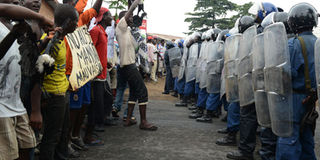Voters standing up for term limits

Demonstrators face off against police officers during a protest against President Pierre Nkurunziza’s third term bid in Bujumbura last Thursday. Photo by AFP
What you need to know:
Determination . A new civic-minded voter is emerging in Africa, one who is not willing to remain passive as politicians disregard the law.
Nairobi. The public demonstrations in Burundi by citizens opposed to President Pierre Nkurunziza running for a third term, are just part of a broader wave of uprisings across Africa.
The continent’s increasingly politically aware public— thought to be too poor or too ethnically-minded to engage in protest for social transformation — is using uprisings, protests and revolts as its political currency.
A new civic-minded voter is emerging in Africa, one who is not willing to remain passive as politicians disregard the law.
Last year, Burkina Faso made international headlines when protestors set fire to the country’s parliament during violent demonstrations against the country’s legislators’ attempt to increase the presidential term limits to three.
Parliament would have paved the way for then president Blaise Compaore — who came to power in 1987 — to prolong his stay at the helm.
Parliament’s intentions sparked a massive revolt from Burkinabes who gathered in the capital, Ouagadougou, and the second biggest city, Bobo Dioulasso, forcing Compaore to resign after 27 years in power.
In the 1990s, when African countries were introducing democratic reforms, term limits were introduced too to end the undemocratic phenomenon of “life presidents”.
Burkina Faso and Burundi are part of a wider trend in Africa in the past few years where presidents introduced term limits only to scrap them for personal interests.
Compaore, interestingly, was the first to have the term limits scrapped in 1997 and later reinstated them in 2000 after political pressure.
Through the late 1990s to the early 2000, six other presidents joined Compaore in bringing back the “Big Man Syndrome” of African politics by removing term limits.
In 1999, Namibia’s Sam Nujoma won a referendum to increase the presidential terms to three. Omar Bongo of Gabon followed suit in 2003, Lansana Conté of Guinea in 2003, Gnassingbé Eyadéma of Togo in 2002, and Zine el Abidine Ben Ali of Tunisia in 2002.
Uganda’s President Yoweri Museveni started the second wave of scrapping term limits in the mid 2000s. As he was nearing the end of his second term after his election in 2001, Museveni won a referendum in 2005 to remove term limits.
The same year, Idris Deby of Chad also scrapped term limits, and so did Paul Biya of Cameroon in 2008 and Abdelazziz Bouteflika of Algeria the same year.
Some presidents also unsuccessfully attempted to have their constitutions changed to allow them an additional term in office. Zambia’s Frederick Chiluba’s quest for a third term in 2001 was successfully opposed by the opposition and his own party.
In 2003, Malawi’s Bakili Muluzi also unsuccessfully campaigned for a constitutional amendment to allow him to run for a third term.
In 2006, supporters of then Nigerian president Olusegun Obasanjo failed to push through a constitutional amendment to give him an extra term.
Niger’s Mamadou Tandja’s attempts to extend his rule resulted in a coup while Abdoulaye Wade of Senegal was rejected by voters in the 2012 elections when he forced his way onto the ballot after serving two terms.
Today, a number of African presidents are on the last days of their administrations and some are openly planning to extend their stay in power. Others are doing it discreetly to minimise the risks of an internal revolt like that in Bukina Faso.
In Rwanda, allies of President Paul Kagame are urging him to stay on as his second term comes to an end in 2016. His critics have no doubt that the president’s allies will do anything that is politically feasible to put his name on the ballot — already they are calling for a referendum to gauge public opinion.
Sanctions and aid suspension may not be a big deterrent to African presidents bent on scrapping term limits, but increasingly, internal mass revolts from outraged citizens are.
Burundi case
The army has broken its silence on the current unrest in Burundi.
The soldiers are appealing to all the political actors to respect the constitution and the Arusha Accord.
The 2000 Arusha Agreement is categorical on limiting the presidential term to a maximum two of five years each.
The move by the army follows the outbreak of protests against President Pierre Nkurunziza’s bid for a third term in office.




